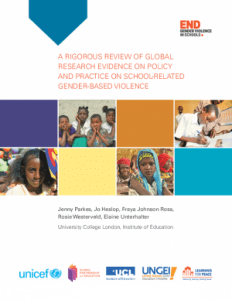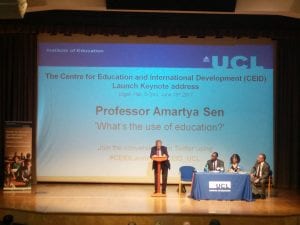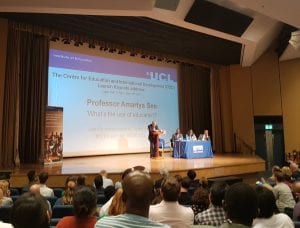CEID Seminar Series 2018/19
The CEID Seminar series is hosted by the Centre for Education and International Development (CEID) at the UCL Institute of Education. Initiated in the 2017/18 academic year, following the launch of the Centre in June 2017, the CEID seminar series is a forum for academics, doctoral students, practitioners and invited speakers to present and open discussion on issues, ideas and debates in the field of Education and International Development. See the full series listing here.
Seminar 7: Gender and Teacher Education in Nigeria, October 18th 2018
Speakers – Professor Elaine Unterhalter, UCL Institute of Education, Dr Amy North, UCL Institute of Education and Yvette Hutchinson, British Council
Chair – Professor Moses Oketch, UCL Institute of Education
Abstract – In the first CEID seminar in the 2018/19 academic year, Elaine Unterhalter and Amy North will present findings from their research in Nigeria on Gender and Teacher education in five Nigerian states. The research took place between 2014 and 2016, and was funded by the MacArthur Foundation and the British Council Nigeria. Yvette Hutchinson, British Council, completes the panel and will present on the British Council’s involvement with the project, its work in Nigeria and in teacher capacity development and gender in particular. Following the panel presentations and discussion, questions will be invited from the audience.
Watch the recording here: https://www.youtube.com/watch?v=okupVsuv1WM
Seminar 8: Violent extremism and the political economy of education in Afghanista, November 8th 2018
Speaker: Dr Tejendra Pherali, UCL Institute of Education
Chair: Professor Moses Oketch, UCL Institute of Education
Abstract
As global attention is concentrated on Islamic State (IS) activities in Syria and Iraq, IS fighters seem to be exploiting the conditions of state fragility in Afghanistan to expand their influence in several districts. It has been reported that IS has a significant dominance in 11 out of 24 districts in the eastern province of Nangarhar where, they control all aspects of community life including, education. Drawing upon qualitative interviews and focus group discussions (N=31) in Kabul and Nagarhar which is considered the IS headquarters in the region, this paper explores the multitude of ways IS is controlling educational processes in Afghanistan. We find that both state and non-state actors compete for control over education, both formal institutions as well as social and cultural discourses about learning. Unlike Taliban who have the nationalist agenda against Western interventions (of all kinds including, education), the IS approach to radicalisation seems to be much more strategic, ideologically broad and aimed at long term political gains in the form of a ‘Caliphate’. Through their brutal tactics, IS fighters influence access, contents and pedagogies to establish their Jihadist ideology, which underpins a wider religious and political justification of the ‘struggle’ against the West and production of a new generation of jihadists. Our research finds that rural communities in Afghanistan play a critical role in shaping the political terrain such as, establishing the conditions under which state sovereignty is contested, negotiated and challenged. As such, they serve the dual purpose: strengthening state authority by sustaining public services including, education; and creating a space for non-state actors to promote alternative ideologies. Finally, we argue that understanding the latter can contribute to critical reflection of the existing education policies and reclaim educational spaces for Afghanistan’s peaceful future.
Livestreaming – This session will be livestreamed via this link: https://youtu.be/wCs8cL9idcI
Access the seminar slides here: Violent extremism and political economy of education in Afghanistan – CEID Seminar 8 slides.
CEID Seminar 9: In service of dominant elites? Nation, Education and Peacebuilding in Post (civil) War Tajikistan, January 16th 2019
Speaker: Dr Laila Kadiwal, Fellow in Education and International Development, UCL Institute of Education
Chair: Professor Moses Oketch, UCL Institute of Education
Following the cessation of the Soviet Union over two decades ago, Tajikistan grapples with ramifications of the civil war, global geopolitics, Soviet legacies and the revival of religious and ethnolinguistic identities– all of which influence identity formation and peacebuilding through contemporary discourses around education and development in Tajikistan. This seminar presents on the ways global and local political, economic, military, social and cultural agendas intersect with people’s identities, and the ways in which these are mirrored in education, fuelling conflict. The seminar draws upon the theories of ‘discourse,’ ‘global governmentality’ and ‘new imperialism’ concerning education, to explore dominant conceptions of national identity and peacebuilding and what implications these have for normalising unequal power relations and social cohesion. With reference to Gorno-Badakhshan, an ethnolinguistic and religious minority province, the session also investigates how local communities are responding to the interrelationships of the local, national and global. The paper argues that global-national-local discourses cast populations as politically compliant and polarised global market-based citizens in a globalised authoritarian state that serves dominant global and local elite interests. Recommendations include ways forward for challenging dominant discourses and for rethinking issues of inequities, social cohesion and sustainable peacebuilding in education policy.
Livestream – This session will be livestreamed via this link:: https://www.youtube.com/watch?v=v3zeD7KaUH8&feature=youtu.be Join the discussion with #CEIDSeminars
Access the seminar slides here: CEID Seminar_Jan 16_2019_Tajikistan
 Close
Close








 commenced with the launch of the
commenced with the launch of the  f economics and philosophy at Harvard University. Attended by over 750 guests, and live streamed globally, Professor Sen’s keynote address received a standing ovation and concluded with a lively and extended Q & A session with the audience in the Logan Hall.
f economics and philosophy at Harvard University. Attended by over 750 guests, and live streamed globally, Professor Sen’s keynote address received a standing ovation and concluded with a lively and extended Q & A session with the audience in the Logan Hall. CEID please visit:
CEID please visit: 